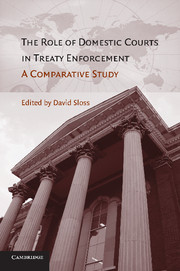Book contents
- Frontmatter
- Contents
- Contributors
- Preface
- Acknowledgments
- 1 Treaty Enforcement in Domestic Courts: A Comparative Analysis
- 2 Does International Law Obligate States to Open Their National Courts to Persons for the Invocation of Treaty Norms That Protect or Benefit Persons?
- 3 Australia
- 4 Canada
- 5 Germany
- 6 India
- 7 Israel
- 8 The Netherlands
- 9 Poland
- 10 Russian Federation
- 11 South Africa
- 12 United Kingdom
- 13 United States
- 14 The Role of Domestic Courts in Treaty Enforcement: Summary and Conclusions
- Index
- References
3 - Australia
Published online by Cambridge University Press: 06 January 2010
- Frontmatter
- Contents
- Contributors
- Preface
- Acknowledgments
- 1 Treaty Enforcement in Domestic Courts: A Comparative Analysis
- 2 Does International Law Obligate States to Open Their National Courts to Persons for the Invocation of Treaty Norms That Protect or Benefit Persons?
- 3 Australia
- 4 Canada
- 5 Germany
- 6 India
- 7 Israel
- 8 The Netherlands
- 9 Poland
- 10 Russian Federation
- 11 South Africa
- 12 United Kingdom
- 13 United States
- 14 The Role of Domestic Courts in Treaty Enforcement: Summary and Conclusions
- Index
- References
Summary
INTRODUCTION
The Commonwealth of Australia emerged as a federation of six states on January 1, 1901, formed under a constitution adopted by the Parliament at Westminster after extensive Australian debate and consultation during the preceding decade. Australia emerged as a new state in the then-international system very much under the umbrella of Britain and, just like the other emerging British colonies of Canada, New Zealand, and South Africa, took some time to find a truly independent voice in international affairs. Indeed, it was not until the First World War and the conduct of significant military campaigns on European battlefields that Australia began to develop a stance approaching that of an independent state in international affairs. The Paris Peace Conference permitted Australia to take its place on the world diplomatic stage and, in the years between the First and the Second World Wars, a more independent Australia began to emerge. Various Empire Conferences gave greater voice to the British Dominions as a constitutional matter, culminating in the 1931 Statute of Westminster that recognized the true independence of the Dominions and their ability to play a role in international affairs, including the adoption of treaties. However, there was an ongoing reluctance on the part of Australia to take the final step onto the international stage and the Statute of Westminster was not adopted during the 1930s.
- Type
- Chapter
- Information
- The Role of Domestic Courts in Treaty EnforcementA Comparative Study, pp. 120 - 165Publisher: Cambridge University PressPrint publication year: 2009
References
- 1
- Cited by

